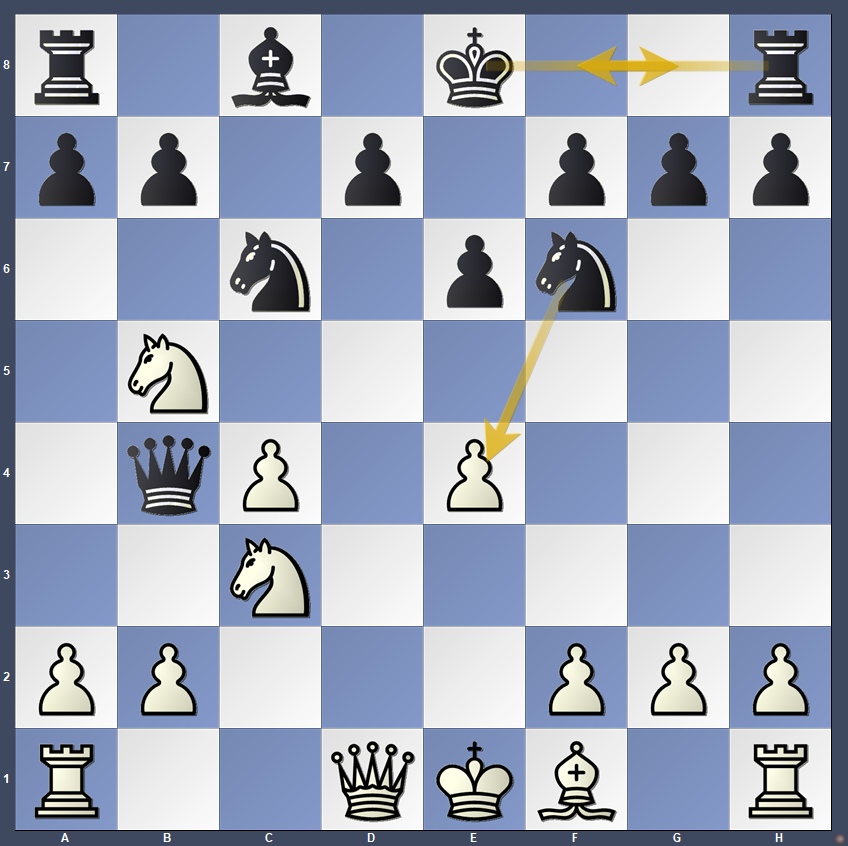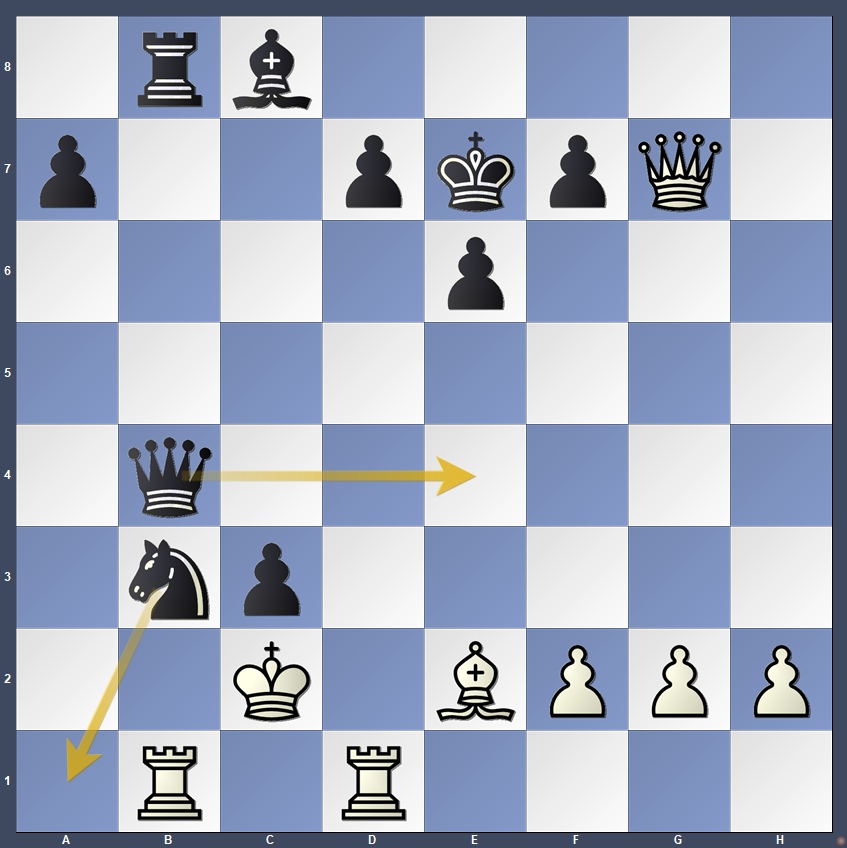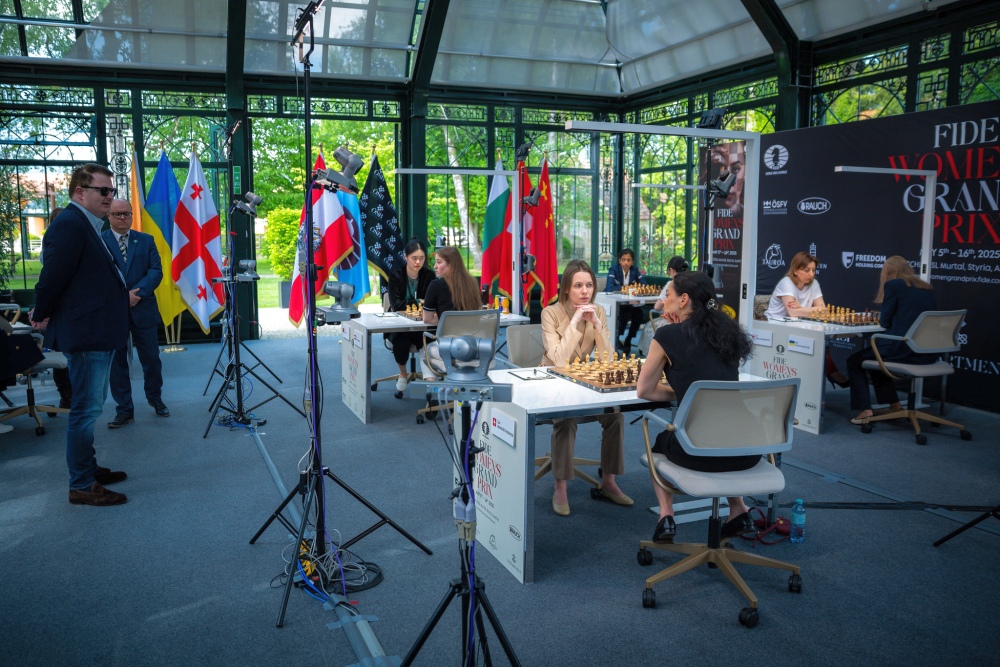
Anna Muzychuk’s momentum stalled with a fourth consecutive draw, but she remains level at the top after Olga Badelka halted Zhu Jiner’s five-game winning run. The race for first place remains wide open ahead of the final round.
Tensions were running high at the orangery on the grounds of Gschlössl Murtal in Styria, as the penultimate round of the 2024/2025 FIDE Women’s Grand Prix series was about to start.
Three of the five games ended in draws, while the two decisive encounters were marked by sharp swings and desperate time scrambles. Anna Muzychuk and Zhu Jiner remain tied for first as they head into the final round. Muzychuk will have the white pieces against Vaishali Rameshbabu and must win to have a shot at clinching both the tournament and the overall Women’s Grand Prix title — provided Zhu does not win her game. Zhu, on the other hand, can afford a draw but must avoid defeat with the black pieces against former world champion Alexandra Kosteniuk.
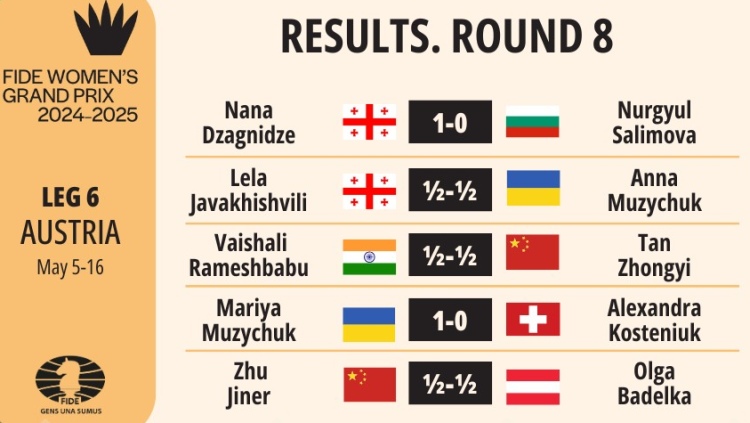
The round started with a minute of silence. Earlier in the day, news broke that the long-serving president of the Austrian Chess Federation and member of the Honorary Praesidium of FIDE, Kurt Jungwirth, passed away at the age of 95.
The first game to finish – after three hours and 20 minutes of play – was between Lela Javakhishvili and Anna Muzychuk. In the English Opening, White (Lela) was trying to make a breakthrough on the queenside. The Georgian was doing better on the clock, but the game was complicated and without any real chances for either side. A threefold repetition sealed a draw on move 28.

Anna didn’t look very pleased as she left the venue. In the first part of the tournament, she had one draw (with her sister Mariya) and three victories. In the second part – four draws. Today’s result puts into question her chances of becoming the outright winner of the final leg of the Women’s Grand Prix, which is what she needs if she wants to win the series and secure a spot in the 2026 Women’s Candidates.
The second leader of the tournament also drew. Playing the French Defence, Olga Badelka managed to stop Zhu Jiner’s run of five consecutive victories. The two relatively quickly progressed to an endgame with a pair of rooks and a pair of minor pieces. Although Zhu had an hour on the clock compared to Badelka’s 30 minutes after 25 moves, it was not enough to tip the balance in her favour in an equal position.
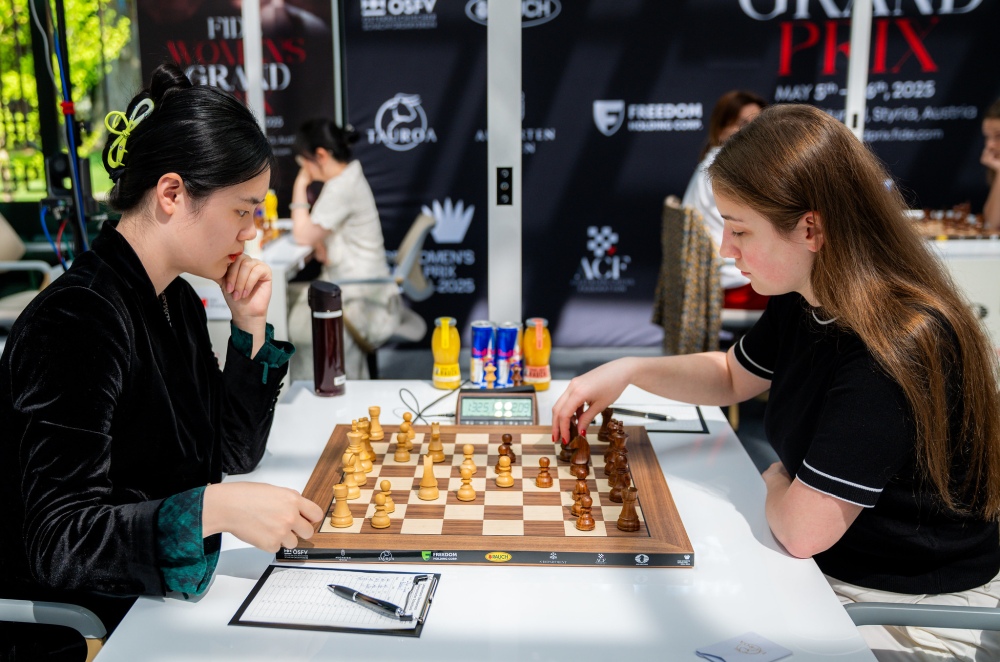
Seeing that Anna drew, Zhu pressed on and even played a bit riskily, hoping that Badelka – who has not had a great tournament, would stumble. But Olga was confident in holding her ground. When nothing more could have been done, after three and a half hours and 43 moves, Zhu had to admit that it was time to call it a day. In the last round, she will have a tough challenge against the former world champion, Alexandra Kosteniuk.
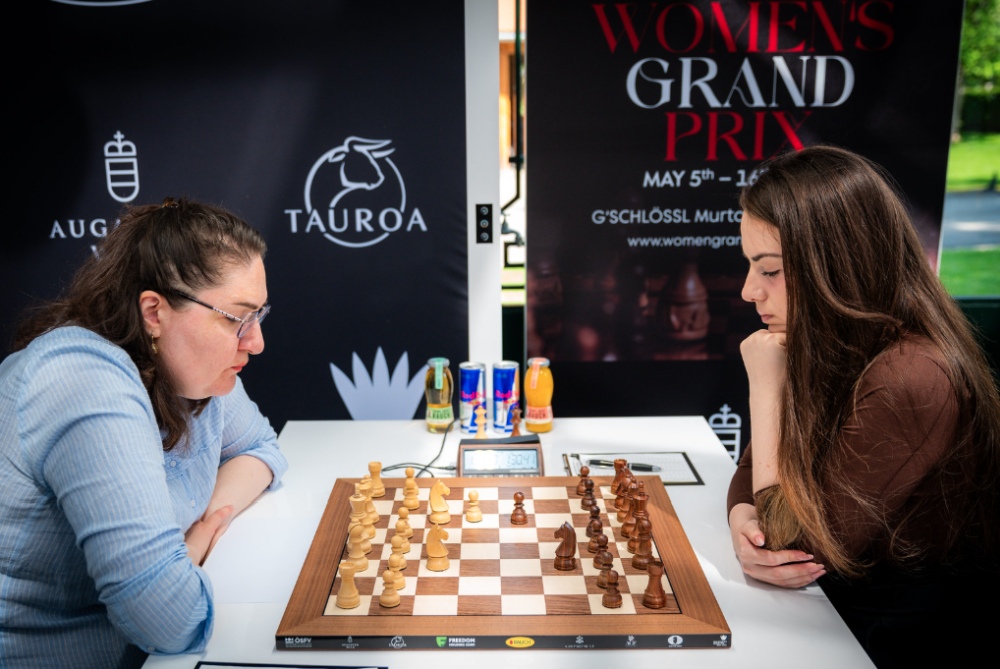
The sharpest and most intense game of the round – and possibly the entire tournament so far – happened between Nana Dzagnidze, who was White, and Nurgyul Salimova. According to the chessgames.com database, this was only the second game between the two. Previously, they met in 2021 during the World Blitz Championship in Almaty (Kazakhstan), from which Salimova emerged as the victor.
Dzagnidze started with the English Opening and managed to get a slight advantage. As early as move 11, the game entered a sharp phase.
White is better. Still, the most logical choice for Black was to secure her king by castling and for the game to run its course. Instead, Salimova embarked on an adventure which would see a very sharp exchange on board.
11…Nxe4? Taking the pawn but at what cost? After the cold-blooded 12.Qc2 Nxc3 13.Nc7+ Kd8 14.bxc3 Nd4 15.Qd2 Qa4 16.cxd4 Kxc7 and Black keeps a pawn but is severely underdeveloped and exposed.
Instead, Dzagnidze made a weak move: 12.a3? and after Qa5 13.Qg4 Nxc3! 14.Qxg7 Nxb5+ 15.b4 Nxb4!! 16.Qxh8+ Ke7 17.bxc4 Qxb4+ 18.Kd1 Qd6+ 19.Kc2 (Ke1 was better) 19…Nd4+ 20.Kc3 Nc6! Black’s risky approach paid off – she got enough compensation and counterplay while White had to be careful because of her exposed king. By this point in the game, both had well under 20 minutes on the clock.
By the time they reached the position below, both were in desperate time trouble.
Black is in control. The best way to proceed was 32…Na1+ 33.Rxa1 Qb3+ 34.Kd3 c2+ 35.Kd2 cxd1=R+ 36.Rxd1 Qb4+. However, Salimova played 32…Qe4+? and after 33.Bd3 Qa4 it was equal again, as White could deliver a perpetual check with 34.Qg5+ Ke8 35.Qg8…. Instead, Nana played 34.Qxc3?? but Nurgyul immediately returned the favour with 34…Nc5+?? (after 34…Rb6, White has no defence against Black’s multiple threats) 35.Kd2 Qf4+ 36.Ke1 Nxd3 37.Qxd3 Rxb1 38.Rxb1 Ba6!? made with seconds on the clock. 38…Qxh2 recommended by the computer leads to an equal position.
After 39.Qa3+ d6 40.Rb4 Qe5+ Both reached the first time control with White now being notably better. Ten moves later, Dzagnidze was completely winning. This was the longest game of the day, finishing after just under five hours of play.
Despite being known for her time troubles, Dzagnidze is having a solid performance in the tournament. With just one loss, five draws and two wins – she is now on 4.5 and is in tied fourth place with Vaishali Rameshbabu who also drew today.
Two games of round eight ended in a draw.
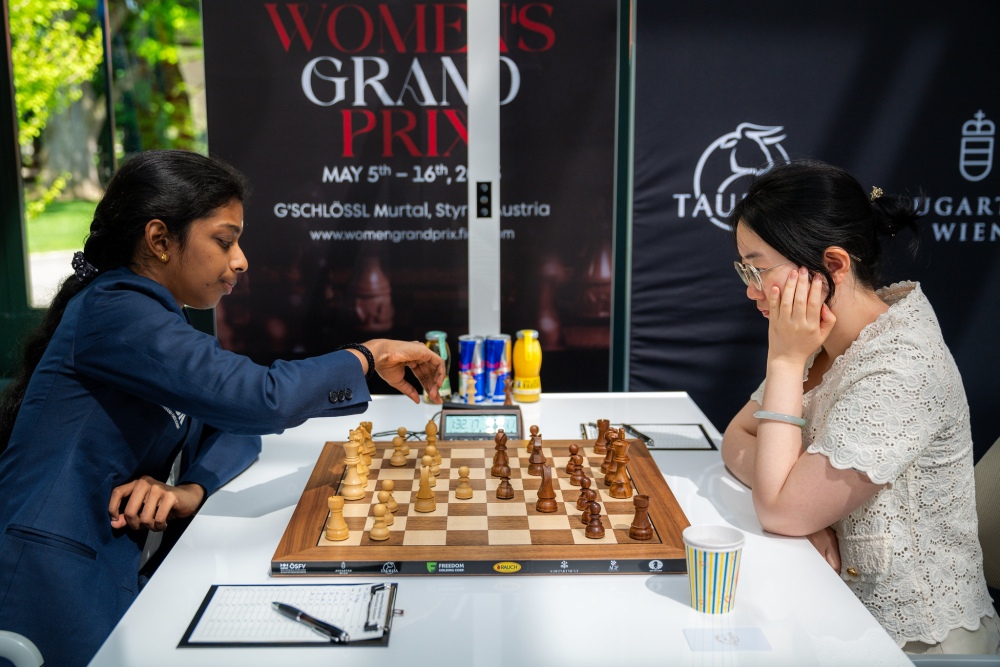
In the Murphy Defence of the Ruy Lopez, Vaishali gained a slight initiative over Tan Zhongyi. However, after 25 moves, Vaishali was down to 28 minutes while Tan had more than an hour. Still, the young Indian GM played steadily, and by move 35 the two transitioned to an even rook endgame. Similarly to her round six win over Salimova, Tan tried to grind her opponent, in another effort to successfully drain blood from stone.
She even temporarily gave up a pawn for some chances, but Vaishali played precisely and a draw was agreed on move 51. After splitting a point, Tan is on 5/8, maintaining chances for one of the top spots. Tan’s final game will be against Mariya Muzychuk, in round nine, while Vaishali faces Anna Muzychuk.

Two former Women’s World Champions, Mariya Muzychuk and Alexandra Kosteniuk, also played a very tense game. In the French Defence, Kosteniuk (leading the black pieces) emerged with a comfortable position. However, in a complicated middlegame, she miscalculated and blundered.
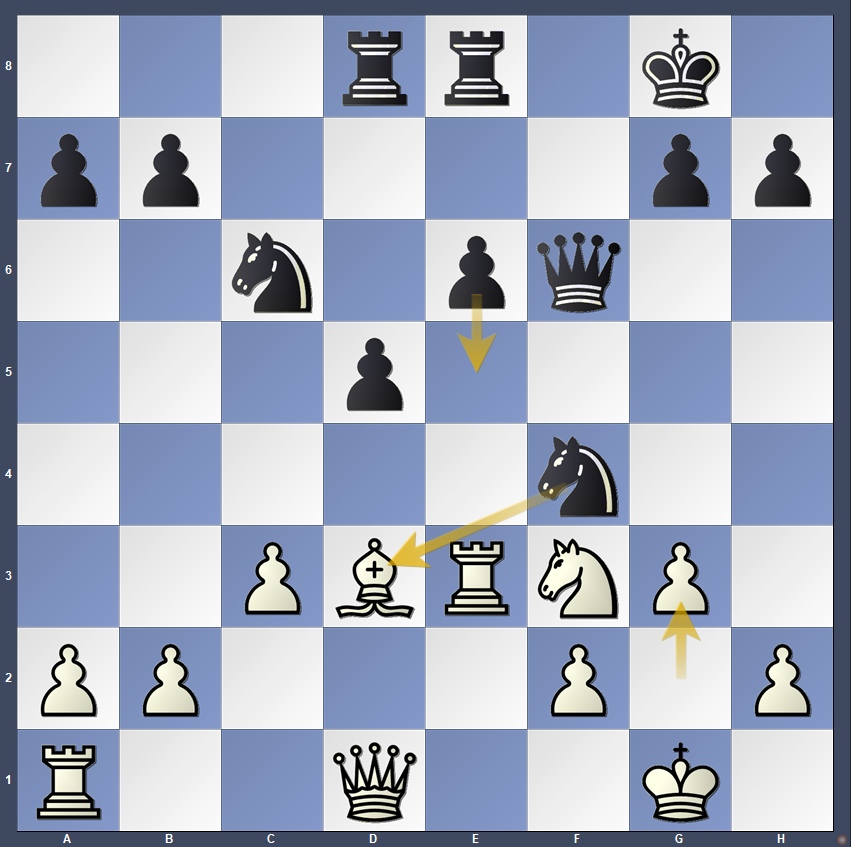
The optimal choice for Black was to exchange the knight for a bishop on d3, followed by advancing her e-pawn with a superior position. Instead, Kosteniuk played the tempting 17…e5 first, which turned out to be the decisive mistake.
18.gxf4 e4 19.Bc2 Qxf4 – Black is forced to give up a piece. Indeed, in the case of 19…exf3, White would have ended up with two pawns up, after 20.Rxe8+ Rxe8 21.Qxd5+ Kf8 22.Qxf3.
20.Nd4 Ne5 21.Rg3 Rd6 22.Qh5 Rf8 23.Rf1 – after White consolidated her position Black was doomed. The rest was a smooth sail for Mariya who won the game on move 49.
Standings after Round 8:

Obituary: Kurt Jungwirth (1929 – 2025)
Kurt Jungwirth was an Austrian politician (serving as the vice-governor of Styria) and also the president of the Austrian Chess Federation for 46 years, from 1971 to 2017.

As noted by Michael Stöttinger, the current President of the Austrian Chess Federation, Jungwirth was not only the longest-serving head of Austrian chess, but he also had a deep impact on the chess world globally.
“Austrian chess owes a lot to Kurt Jungwirth, who held many senior positions in the chess world: from 1978 to 1986 he was Vice-President of FIDE. From 1986 to 1998 he was the President of the ECU and from 1990 to 1998 Continental President of FIDE for Europe and the founder of the famous Mitropa Cup tournament”.
The Austrian press widely reported on the passing of Jungwirth, noting his careers in politics and chess.
Round 9 – the final round – starts on Thursday, May 15 at 2 PM CET (an hour earlier than on the previous days).
Round 9 pairings:
Olga Badelka – Nana Dzagnidze
Alexandra Kosteniuk – Zhu Jiner
Tan Zhongyi – Mariya Muzychuk
Anna Muzychuk – Vaishali Rameshbabu
Nurgyul Salimova – Lela Javakhishvili
Written by Milan Dinic
Photos: Przemysław Nikiel and politik.steiermark.at/
About the tournament:
The tournament in Grosslobming is the final in a series of six tournaments in the 2024/2025 Women’s Grand Prix cycle.
Format: Ten players play a round-robin tournament (9 rounds). The time control is 90 minutes for the first 40 moves, followed by 30 minutes for the rest of the game, with an increment of 30 seconds per move starting from move 1.
Prize fund: €120,000 distributed among 10 participants based on placement (see Regulations)
For more information about the event, visit: womengrandprix.fide.com/
About the Women’s Grand Prix series
The FIDE Women’s Grand Prix (WGP) Series 2024–25 stands as a premier series in the international women’s chess calendar. In its seventh season, it serves as one of the crucial pathways to the Candidates.
The event comprises six tournaments, hosted in different countries: Georgia, Kazakhstan, Monaco, Cyprus, India and Austria.
The scoring system is conceptualised in a way that favours not just tournament victories, but consistency across events. Each player has a right to play in three out of the six events in the series.
The event is part of FIDE’s World Championship cycle, and the top two players in the WGP will qualify for the 2026 Candidates tournament. The winner of the Candidates will become the challenger to the current Women’s World Champion Ju Wenjun, who successfully defended her title against Tan Zhongyi in their 2025 match.



